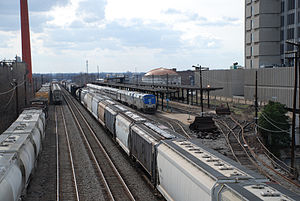Birmingham, Alabama (Amtrak station)
|
Birmingham
|
|||||||||||
|---|---|---|---|---|---|---|---|---|---|---|---|
 |
|||||||||||
| Location | 1819 Morris Avenue Birmingham, AL United States |
||||||||||
| Coordinates | 33°30′44″N 86°48′26″W / 33.51222°N 86.80722°WCoordinates: 33°30′44″N 86°48′26″W / 33.51222°N 86.80722°W | ||||||||||
| Owned by | CSX Transportation | ||||||||||
| Line(s) | CSXT | ||||||||||
| Platforms | 2 island platforms, 1 in use | ||||||||||
| Tracks | 2 | ||||||||||
| Construction | |||||||||||
| Parking | More than 100 long term spaces in a nearby City of Birmingham lot | ||||||||||
| Disabled access | Yes | ||||||||||
| Other information | |||||||||||
| Station code | Amtrak code: BHM | ||||||||||
| History | |||||||||||
| Opened | 1960 | ||||||||||
| Original company | Louisville and Nashville Railroad | ||||||||||
| Traffic | |||||||||||
| Passengers (2016) | 42,930 |
||||||||||
| Services | |||||||||||
|
|||||||||||
Birmingham is a train station in Birmingham, Alabama. It serves Amtrak's Crescent, which provides daily service between New York City, Atlanta, and New Orleans. The current station is located on the site of another station originally built by the Louisville and Nashville Railroad in 1960, although Amtrak did not use the building itself, which was torn down in the 2000s.
The L&N built the new station for $500,000, replacing Union Station which it had used since 1887. One writer described this new station as "modern in every respect." When Amtrak assumed control of most inter-city passenger service on May 1, 1971, its Floridian continued to use the L&N station. The Southern Railway, which had declined to join Amtrak, continued to use its own station several blocks to the northeast. On February 1, 1979 the Southern Railway conveyed its passenger service to Amtrak and the Southern Crescent (shortened to Crescent) began serving the ex-L&N station as well. Amtrak discontinued the Floridian in October, 1979 but the Crescent has operated uninterrupted ever since. Between 1989-1995 Alabama funded a Mobile, Alabama section of the Crescent named the Gulf Breeze.
Birmingham plans in 2010 to build a new multimodal station at the site of the 1960s Louiville and Nashville station. It will connect to the current station which will be reconfigured for access to the platforms.
...
Wikipedia
